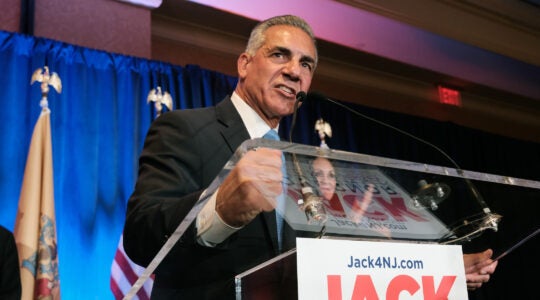Judging from the positive feelings at the GA, local federations are happy with Jerry Silverman, the new CEO of the Jewish Federations of North America. But it looks like the peace and euphoria lasted all of 48 hours, as the long-running tensions between the federation system’s two overseas organizations have resurfaced.
For the past 18 months, the American Jewish Joint Distribution Committee and the Jewish Agency for Israel have been trying to hammer out an agreement on how to split the $160 million – $200 million per year that the federations allocate to both organizations’ core budgets. After doing away with a complicated allocations process known as ONAD, the two sides had basically agreed to go back to a split that gave 75 percent of the money to the Jewish Agency and 25 percent to JDC.
But the deal wasn’t closed, and negotiations have dragged on for more than a year and a half. Two prior times during the talks — which have been brokered by Kathy Manning, who took over as the chairwoman of the Jewish Federations of North America this week — the two sides seemed closed to an agreement. Each time, however, JDC backed out at the last minute for different reasons.
This time, JDC seems to be saying point blank that it needs more money and that its mission of feeding the poor and elderly in the former Soviet Union and Eastern Europe needs to take precedence right now over that of the Jewish Agency.
According to sources, the two sides had reached an agreement to extend the 75-25 split several weeks ago, but Thursday, JDC’s chairman, Irv Smokler, sent out an e-mail to his board saying that there is no deal: “The current split of 75 percent for JAFI and 25 percent for JDC came into being in 1952 when Israel was ready to accept large numbers of immigrants and JDC had declining welfare roles in Europe as a result of the closing of the DP camps. The world has changed significantly and the funding formula must reflect this new reality,” he wrote.
We’ll keep you posted.
Here is the rest of Smokler’s letter:[[READMORE]]
Dear ########
In an effort to keep you updated on the status of the JDC/JAFI Agreement, I share with you the e-mail message below that I sent today to Kathy Manning, the Chairman of the Board of The Jewish Federations of North America (formerly UJC).
Dear Kathy,
The purpose of this letter is to confirm my phone conversation and formally indicate that the suggested changes to the third draft agreement between JDC and JAFI will not work for JDC. Therefore reluctantly we must indicate that there is no national agreement on the distribution of overseas core dollars.
This rejection of the proposed changes should in no way be seen as a reflection on the strong partnership JDC and JAFI have developed over the 18 months. Nor do we fault The Jewish Federations of North America in their efforts to settle this issue.
Since negotiations began, there has been a drastic change in circumstances for the poor elderly Jewish clients we serve across the globe. Specifically in the absence of adequate resources, we have been forced to curtail or eliminate food, medicine, and other material needs to 60,000 poor elderly Jews. In addition, we have no resources to serve 20,000 poor Jewish children and their families. We would be derelict in our responsibilities to our constituents if we did not seek more resources for them.
The current split of 75 percent for JAFI and 25 percent for JDC came into being in 1952 when Israel was ready to accept large numbers of immigrants and JDC had declining welfare roles in Europe as a result of the closing of the DP camps. The world has changed significantly and the funding formula must reflect this new reality.
JDC urges you to convene immediately a leadership group, including JDC and JAFI, to develop a needs-based allocation system.
Sincerely,
Irv Smokler
JTA has documented Jewish history in real-time for over a century. Keep our journalism strong by joining us in supporting independent, award-winning reporting.





